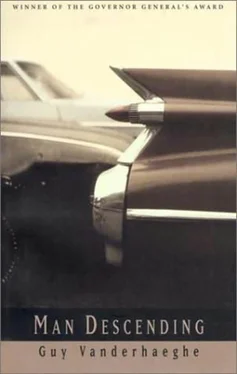On my shaky plastic desk my books are piled. I have Herzen, Dostoevsky, Gogol, Turgenev, Lermontov, Soloviev, Leontiev, Gorky, Chekhov, Pushkin, Tolstoy and Rozanov to keep me company in exile. Day by day I feel a little of my guilt subside as I share her sentence. Like her father, Cynthia sleeps in an institution.
The people who care for her tell me she doesn’t remember me from visit to visit. That is why Miriam never goes to visit the child. It is pointless , she says. Cynthia is profoundly retarded, and nothing will ever change that. I refuse to feel guilt .
But my daughter is four years old now. She is no longer a baby. She must remember me.
And whenever I look into her wise, calm eyes set like stones in their Asiatic folds, I sense the grandeur of Russia, the infinite, colossal steppes sleeping there.
“A NEW FACE,” said Albert the orderly in a dispirited voice. He had spent twenty years in the navy, had his nose broken twice and his arms covered with an ornate green scrollwork of tattoos. That, a pension, and some bad memories were all he had to show for it. Now, much to his despair, he was an orderly in a hospital. He lingered by the bed and rustled the pages on his clipboard officiously. “Mr. Ogle? Is that it?” he said, concentrating on a sheet.
“Yes, that’s right. Tom Ogle.”
“B.M. this A.M.?” inquired Albert, his pen poised above the clipboard.
“I’m sorry,” Ogle said, confused, unsure whether to trust his ears or not. “I didn’t catch that.”
“B.M.,” said Albert, tapping the pen on his metal watch-band. Click. Click. Click . “B.M., B.M.,” he said impatiently.
“Bowel movement,” translated Morissey, the patient in the next bed. He was a rack of bones and loose skin moored to the narrow bed by transparent tubing stuck in his veins. Looking at him, Ogle estimated he couldn’t weigh more than a hundred pounds. Morissey stared back with the saucer eyes of a famine victim glittering in his wizened face. His dentures slipped and cracked on shrunken gums. “Bowel movement, he means,” Morissey repeated, sawing the air inappropriately with a bony hand whose nails were as yellow and ridged as a chicken’s feet. “He’s asking if you had a shit this morning.”
“No,” said Ogle, turning back to Albert, “I didn’t.”
Albert made a mark on the sheet and went out.
“I don’t like that son of a bitch,” said Morissey in a stage whisper that could have been heard in the next room. “He’s rough – got no consideration. You should see the bastard put in a catheter. You’d think he was shoving a meat thermometer into a roast of beef. Jesus.” He considered for a moment. “The other one though – David – he’s okay.” He paused. “He’s a Jew.”
“Yeah?” said Ogle.
“Imagine,” said Morissey, “a Jew working in a hospital who ain’t a doctor.”
David the orderly, the bedpan-fetcher. David the polymath, whose mind was a blizzard of equations, snippets of verse from Heine and Browning, contending languages, and line scores from yesterday’s baseball games. Perhaps as a consequence of the perpetual storm of information blowing in his head, he dropped urine specimens, upset trays, and generally careened recklessly among the beds.
But if his hands had no aptitude for graduated cylinders and bedpans, his own private tragedies and melancholy lent them gentleness whenever they came in contact with flesh. A refugee of post-war Europe, David had shunted through eight different countries, and finally, as Ogle later came to imagine, collapsed of nervous exhaustion in Canada. A cousin had drawn him to Saskatchewan, and now, marooned in the midst of the prairies, he yearned for the ancient sun-baked stones of Jerusalem, the oranges of Jaffa, the lithe and saucy sabras packing firearms.
Ultimately, however, his courage failed him and he never packed and left. No one in the hospital was sure why. People speculated that he sensed that the reality could never equal the bounty, the splendour, the milk and honey of the land of Canaan that he imagined. Better to be here, dreaming, than there, disillusioned.
“Yeah, David’s okay,” said Morissey. “Better than most, and believe me, I know them all. Everybody. Doctors, nurses, orderlies, aides. I should. I been here six months; ever since January three. I’m a regular. Seen three guys die in that bed,” he said primly. “That’s why I got a policy of not getting too friendly.” He paused meaningfully. “With nobody.”
He extricated his arm from a loop of intravenous tubing and turned over on his side, his back to Ogle. “Jesus,” he said tiredly, staring out at the ragged green of the trees tearing the sunlight before it struck the lawn, and watching the clouds shred in the wind, “another day, another dollar. It’s a great life if you don’t weaken.”
Ogle, who had been brought in the night before, after collapsing at work, felt panic strumming in his gut. His throat pinched and he felt damp invade his groin and slide down his spine into the small of his back.
“The doctors,” he said, holding his voice steady, treading carefully the tightrope of his anxiety, “when do they make their rounds? When will I see my doctor?”
“Don’t get your shit in a knot,” Morissey replied. “In here you learn to wait. If your doctor is anything like the rest, he’ll come when it suits. But don’t start thinking about getting shut of this place in a hurry. They don’t put nobody on this ward for a tune-up.” And he snapped his false teeth in anger at the very idea.
Morissey was right. Ogle’s doctor made infrequent appearances when it suited him. Nevertheless, Ogle spent the mornings perched on the edge of his bed while the doctors made their rounds, keeping a sharp watch and scrutinizing the hallways, daring to hope Dr. Bartlett would make an appearance, and, with the utterance of an incomprehensible medical term and a flourish of his healer’s hand, dispel, like a necromancer, the terrible sentence of uncertainty. But four days of this and a battery of alternately painful, humiliating, and exhausting tests taught Ogle the rudiments of resignation. He was made aware also of something else.
Ogle was young – not yet thirty – and had never considered the ills to which the flesh is heir. He was not yet acquainted with sorrow and grief. But sitting on the edge of his bed he was introduced to the uninterrupted parade of disease and infirmity that crept and wheeled past his doorway. The participants in this cavalcade lurched by on canes, supported themselves against walls, tottered along clinging to the arms of nurses, rolled briskly past, pushed by orderlies. Senile old ladies with inquisitive, darting eyes and flickering vipers’ tongues cried out for babies they had borne half a century before, their hair as white, startled, and on-end as a dandelion gone to seed. A victim of kidney disease rolled by, his mind overwhelmed by the poisons his body could no longer eliminate, calmly and silently smiling to himself, his monstrously swollen leg supported on a sheepskin and ripening to a shiny, mottled-purple iridescence. A coronary patient took his first post-convalescent, tremulous steps, his face vibrant with fear and his bathrobe fallen open to display a livid blue scar on his chest. A diabetic who had lost a leg to gangrene swung by on crutches, his face grey and wrinkled with anxiety and concentration.
And as Ogle watched them troop by, he wrung his wet palms together and shuffled his cold feet in his slippers. There was little else to do. There were no visitors to relieve the monotony because Ogle had never troubled to make friends. He was an essentially shy man who had early learned to disguise his timidity with rancour, and who had, given time and practice, transformed his mouth into a cynical gash in what otherwise would have been an open and frank face. He had the neurotic’s partial vision of life, and a sense of the absurdity which adheres to all effort when observed in the light of a long enough perspective. This had never made him popular. Most people didn’t care for his desperate, crabbed views. Of course, the people from the office had felt obligated to send him a get-well card and flowers (they couldn’t ignore him; he had keeled over at their feet), but no one had troubled to visit him.
Читать дальше












